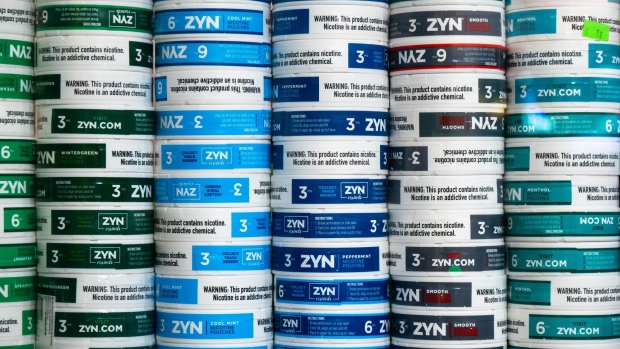Mar 1, 2024
Philip Morris Faces Lawsuit Over Zyn Oral Nicotine Pouches
, Bloomberg News

(Bloomberg) -- The tobacco industry’s next big hope for a less-harmful nicotine product, the oral nicotine pouch, just received its first major legal challenge in a lawsuit that says Philip Morris International’s Zyn product is addictive and harmful to young people.
The lawsuit says that the pouches deliver more nicotine than cigarettes, and that Philip Morris benefits from “Zynfluencers” who promote the brand on social media, with an estimated 30,000 TikTok accounts that use the hashtag #Zyn.
The single plaintiff, Bailey Wolters, alleges addiction and dental issues as a result of his Zyn use. The suit, seeking class-action status, also names as a defendant Stockholm-based Swedish Match, which made the pouches before a Philip Morris affiliate bought it for $16 billion in 2022.
The companies failed to warn about the risk of addiction and other harmful effects like cognitive issues, cardiovascular injuries, gastrointestinal problems and gum disease, the lawsuit says. It cites a study showing that Zyn is gaining popularity with teens because of marketing, and others that say nicotine use in adolescence has lasting adverse consequences for brain development.
Philip Morris didn’t immediately return a message seeking comment. The Stamford, Connecticut-based company said in a recent email exchange regarding Zyn that its products “are not for those who don’t already use nicotine products, and never for those below the legal age of purchase.”
Zyn has become something of a conservative cause celebre in the US in recent months, with Representative Marjorie Taylor Greene of Georgia calling for a “Zynsurrection” after Senate Majority Leader Chuck Schumer of New York pushed for a federal investigation of the product’s marketing. Former Fox News host Tucker Carlson has praised Zyn effusively.
The case was brought by the law firm, Schlesinger Law Offices PA, whose initial lawsuit against Juul Labs investors including Altria Group Inc. expanded into thousands of legal actions and led to Altria’s eventual settlement of $235 million.
©2024 Bloomberg L.P.

